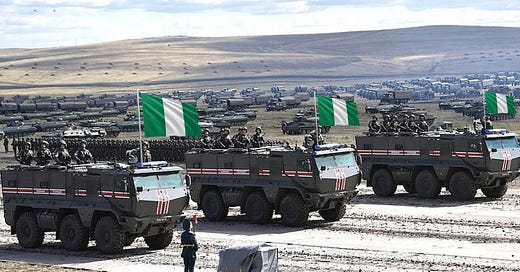Happy Friday,
I think we are going to stick with Friday for sending out this newsletter. I like the end-of-the-week vibes.
This newsletter is about politics, economics, and culture in Nigeria. More of the first two though. So if you are interested in these topics, please subscribe. Or if you know someone who might be interested, do share.
I publish once a week, so definitely not spamming your mailbox.
And I’ll be chuffed to hear your thoughts. Please feel free to disagree. My email is solomon.elusoji@gmail.com.
On Tuesday, reports emerged that a coup was imminent in Guinea Bissau. Heavily armed men had surrounded the Palace of Government where President Umaro Sissoco Embalo and prime minister Nuno Nabiam were believed to be attending a cabinet meeting. The streets were tense.
My Guinea-Bissau journalist friend, Amati, replied tersely on Whatsapp: “It's probably a coup attempt . . . ministers were able to leave the premises . . . but the whereabouts of the president and the prime minister remains unclear.”
But the President survived. The prime minister too.
"What I can guarantee is that the situation is under control,” Mr. Embalo later said.
If it had been successful, Guinea Bissau would have been the fourth West African nation to experience a military takeover within two years. On social media, many Nigerians wondered: could Nigeria be next?
Military coups rarely happen in isolation. They are usually in response to significant government failure and public discontent. Recent successful coups in Mali, Burkina Faso have been preceded by widespread insecurity, stemming particularly from a jihadist campaign that has killed thousands and displaced millions. Malians protested on the streets for many months, calling on then President Ibrahim Boubacar Keita to resign, before the soldiers decided enough was enough. The ouster of Burkina Faso’s Roch Kaboré bears similar dynamics. Public confidence in the president’s ability to secure the country was on a low after militant attacks that began in 2015 claimed more than 2,000 lives and forced 1.5 million from their homes. According to the BBC, schools are closed in large parts of Burkina Faso because it is too dangerous for them to open.
Where does this leave Nigeria, unarguably the largest economy and most populated country in the region with, similar insecurity worries?
On Thursday, while addressing State House correspondents in Abuja, the nation’s capital, Babagana Zulum, who governs Borno State, one of the worst affected states by jihad terrorism in Nigeria, warned that the Islamic terror group ISWAP could take over the country if the government does not act fast. “We shouldn’t allow ISWAP to grow,” Mr. Zulum said. “ISWAP are more sophisticated, more funded, and they are more educated . . . otherwise, what Boko Haram did will be child’s play.”
Meanwhile, in northwestern Nigeria, murderous bandits continue to raid villages and inflict pain. On Thursday, at least six people, including a village head, were killed in one community in Katsina state. Last month, an estimated 200 people were killed and 10,000 displaced after armed bandits invaded communities in northwestern Zamfara State, according to government sources.
The Nigerian government’s response has been a mix of rhetoric and action. On one hand, government vuvuzelas have argued that the country’s security situation is better than it was in 2015 when the current administration took over. On the other hand, funding for the military has steadily increased since 2017, allowing for the purchase of new equipment like Tucano jets and the recruitment of fresh fighting men.
And the top brass seems happy. “The drive as mandated by Mr. President is to increase our strength and have more feet on the ground in addition to all the things we are doing,” Chief of Army Staff Farouk Yahaya said in December. “And he (the president) has provided all the resources for this.”
In a television interview in January, the Chief of Defence Staff, General Lucky Irabor, said a coup was now unthinkable in Nigeria. “Today, I believe that Nigerians are no longer in doubt as to the subordination of the military to civil rule,” the top military chief said. “I believe that no one is in doubt that democracy has come to stay.”
Great reassurances for Nigeria’s yet fragile democracy it must be said, but the true barometer of things remains what’s happening on the streets. How many people are hungry? (In Sudan, President Omar Bashir was toppled by protests that began over the increasing price of bread) How many people are angry? How many people are enraged? How many people are saying enough is enough?




